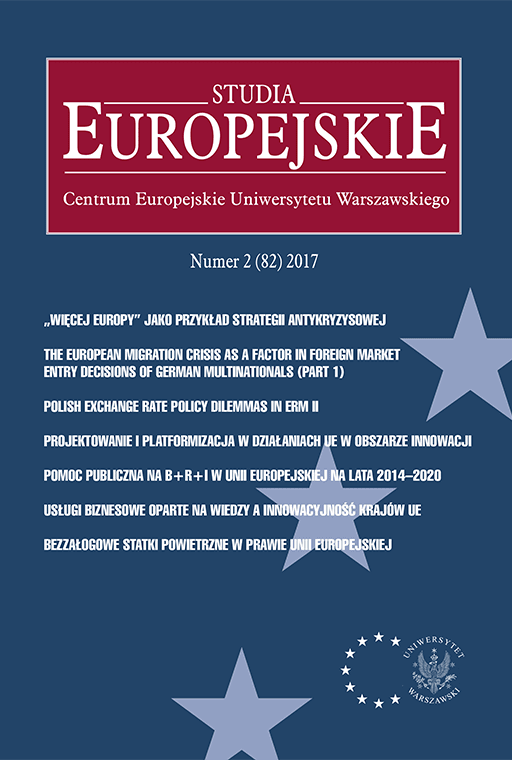
ISSUE: 2/2017
- Volume 82
- Number 2
- 2017
Subscribe NEWSLETTER
Studia Europejskie –
Studies in European Affairs
ISSN: 1428-149X
e-ISSN: 2719-3780
License
Articles published in the journal are under a Creative Commons Attribution – Non Commercial – No Derivatives 4.0 International License
„Więcej Europy” jako przykład strategii antykryzysowej – próba oceny efektywności
„More Europe” as an Example of the Anti-crisis Strategy – An Attempt to Assess Its Effectiveness
Abstract
The author examines the role and effectiveness of the “more Europe” approach to the crisis in the general area of politics (in wide terms), and in relation to the crises in the European Union (in narrow terms). Assuming that the crisis is a perceived situation (coming from the field of perception), and not an objective and scientifi c set of data, the author tries to assess the actions of policy-makers and show what effects they cause. Referring to the postfunctionalist theory, it is shown in the article that “more Europe” means a strong politicization of the EU, which leads to the polarization – on the one hand, a stronger EU jurisdiction (based on output legitimacy), and on the other hand, the strengthening of national identities. Hence, the logic of technocratic and rational EU mechanism collides with the competition with pre-material values of the logic of identity. This is why the eurozone crisis, which was initially compatible with the logic of economic theories turned into a struggle for identity – with a role of the nation state and democracy in the background. The author concludes that the proponents of the “more Europe” approach do not realize the recently emerged conditions and contexts. Paying attention to the perception unveils that the strategy of “more Europe” can be counter-productive, because the decisions made under the pressure of the crisis may lead to even greater uncertainty and insecurity of those people affected.
References
Anderson B., Wspólnoty wyobrażone, rozważanie o źródłach i rozprzestrzenianiu się nacjonalizmu, Znak, Kraków 1997.
Beck U., Społeczeństwo światowego ryzyka, Wydawnictwo Naukowe Scholar, Warszawa 2012.
Borchardt K., Przemiany w myśleniu o kryzysach gospodarczych, w: O kryzysie, red. K. Michalski, Wydawnictwo Res Publica, Warszawa 1990.
Chournazidis A.J., The fi nancial crisis and the concept of risk in the European Union, “Procedia – Social and Behavioral Sciences”, No. 148/2014.
Cichocki M.A., Unia w Unii. Strefa Euro w przebudowie, „Nowa Europa. Przegląd Natoliński”, numer specjalny 2(6)/2015.
Cooper H., Where European democracy goes to die, “Politico”, 12.07.2016.
Dahrendorf R., Nowoczesny konfl ikt społeczny, Czytelnik, Warszawa 1993.
de Vries C., Hoffmann I., Fear not Values. Public Opinion and the Populist Vote in Europe, Fundacja Bertelsmanna, “Euroopinions”, nr 3/2016.
Dobry M., Socjologia kryzysów politycznych, Wydawnictwo Naukowe PWN, Warszawa 1995.
Evans S., ‘More Europe!’: Germany’s battle-cry for the Eurozone, BBC News, http://www.bbc.com/news/world-europe-18557059 (dostęp 9.01.2017).
Final Report of the Future of Europe Group of the Foreign Ministers of Austria, Belgium, Denmark, France, Italy, Germany, Luxembourg, the Netherlands, Poland, Portugal and Spain, http://www.cer.org.uk/sites/default/files/westerwelle_report_sept12.pdf (dostęp 9.01.2017).
Higgs R., Crisis and Leviathan, Oxford University Press, Oxford 1987.
Holton R.J., The Idea of Crisis in Modern Society, “The British Journal of Sociology”, Vol. 38, No. 4/1987.
Hooghe L., Marks G., A Postfunctionalist Theory of European Integration: From Permissive Consensus to Constraining Dissensus, “British Journal of Political Science”, nr 39/2008.
Jensen M.D., Martinsen D., Out of Time? National Parliaments and Early Decision-Making in the European Union, “Government and Opposition”,
Vol. 50, Issue 2/2015, s. 240–270.
Moravcsik A., Federalism in the European Union: Rethoric and Reality, w: The Federal Vision: Legitimacy and Levels of Governance in the United
States and the European Union, red. K. Nicolaidis, R. Howse, Oxford 2001.
PM letter to President of the European Council Donald Tusk, 10.11.2015.
Scharpf F.W., Legitimierung, oder das demokratische Dilemma der EuroRettungspolitik, ZBW – Leibniz-Informationszentrum Wirtschaft, Wirtschaftsdienst 2014/Sonderheft.
Schimmelfenning F., Mehr Europa – oder weniger? Die Eurokrise und die europäische Integration, Bundeszentrale für Politische Bildung, “Aus Politik und Zeitgeschichte”, nr 52/2015.
Language: Polish
Pages: 9-21
How to Cite:
Harvard
Cichocki, M. (2017) "„Więcej Europy” jako przykład strategii antykryzysowej – próba oceny efektywności". Studia Europejskie – Studies in European Affairs, 2/2017, pp. 9-21.